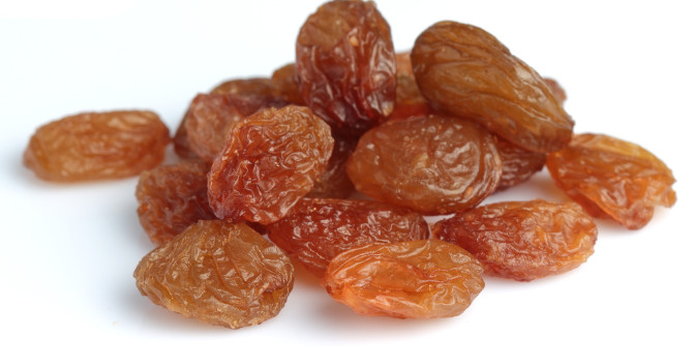Referred to as nature's candy, raisins are simply dried grapes. This fruit is popular all around the world and is grown in the Americas, Europe, the Middle East and South Africa. There are numerous varieties of raisins and different techniques to create this dried fruit.
The natural way to create raisins is by sun drying, but many manufactures now use a mechanical process to dry raisins. The most popular types of raisins include the Malaga, Sultana, Monukka, Muscat and Thompson raisins. Raisins can be either seedless or contain seeds.
Consuming and Storing Raisins
Raisins can be eaten either raw or can be cooked. When raisins are cooked, they often plump up in size and soften in texture. Raisins should be stored in a cool, dry air-tight container. You could also try keeping them sealed in a zipped bag in the refrigerator. They have a shelf life of about six months.
Nutritional Value
Raisins are composed of 67 to 72% of sugar. The sugar is fructose. Due to the simple nature of fructose, raisins are easily digested and supply the body with nearly instant energy.
Raisins are naturally cholesterol and fat free. As a health benefit, raisins are rich in antioxidants. These antioxidants are found in the form of phenols. These phenols, flavan-3-ols, procyanidins, and hydroxycinnamics, have been shown to help prevent oxygen-based damage from free radicals. Compared to grapes, raisins have a lower amount of antioxidants due to the drying process.
Raisins contain vitamin K, vitamin C, vitamin E and vitamin B. Specifically for women, raisins contain the mineral boron, which has been shown to promote bone health and prevent osteoporosis. Boron helps the body better process estrogen and vitamin D.
The olenolic acid and phytonutrients in raisins have shown to promote health gums and teeth. Research has shown that raisins can help prevent macular degeneration of the eyes. The fiber in raisins helps cure constipation and promotes a health digestive tract.
Nutritional value of raisins per 100g:
- 299 calories
- 0.5 g fat
- 79 g carbohydrates
- 59 g sugar
- 4 g dietary fiber
- 3 g protein
Additionally, 100 g of raisins provides you with 5% of your daily-recommended dose of calcium, 15% of your recommended daily intake of iron and 16% of your daily-recommended dose of potassium.
Healthy Dishes
Raisins are a very versatile fruit that can be added to numerous dishes. For breakfast, try adding raisins to your breakfast cereal, granola, hot oats or top your yogurt with a tbsp of raisins. Consider adding raisins to baked goods such as muffins, breads and cookies to increase their antioxidant levels. Excellent entrees that you can incorporate raisins into include chicken topped with raisins, turkey stuffed with raisins. You may also want to try making a raisin compote for a sweet, delicious, healthy dessert.



